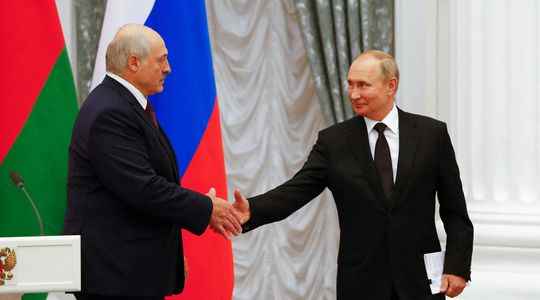While the eyes of the world are on Ukraine, another Eastern European country is worried: Belarus. This country of 9.3 million inhabitants seems to be gradually becoming the vassal of Russia. This observation is confirmed by the Kremlin’s proposal to hold negotiations with Ukraine in Gomel, the second largest municipality in Belarus. A proposal rejected by the Ukrainian president saying that “any other city” outside this country would be suitable. Lately, Minsk has turned into a rear base for Moscow, endangering its sovereignty. And this shift could materialize on paper. At the head for 28 years of a country which he rules with an iron fist, Alexander Lukashenko has also decided to hold a constitutional referendum this Sunday, described as illegitimate by the opposition and considered as a attempt to further prolong his stay in power.
Amendments to the Basic Law proposed by the regime are particularly troublesome for national sovereignty. This next constitutional referendum should formally repeal the clauses guaranteeing the neutrality of Belarus, as well as its obligation to remain free of nuclear weapons. More concretely, this change of status would allow the country to permanently host nuclear weapons and Russian forces. On the diplomatic level, the Eastern European country is proving increasingly dependent on its large Russian neighbor with which it shares 950 kilometers of common border. Indeed, the master of the Kremlin seems to be able to do whatever he wants with his Slavic “little brother”. Witness the presence on Belarusian territory of Russian troops a few weeks before they invaded Ukraine: some 30,000 soldiers from Moscow, who officially took part in exercises, found themselves 200 kilometers from the Ukrainian capital Kiev. .
Yet few leaders outside the Baltic region have reacted on the Belarusian issue. Emmanuel Macron demanded on Saturday evening from his counterpart Alexander Lukashenko that he “demands the withdrawal of Russian troops from his soil as soon as possible”, and who are engaged in the invasion of Ukraine, reported the Elysée. The decision to shelter Russian troops poses a double problem: it is not only a violation of Belarusian sovereignty and it also poses an additional challenge to NATO, whose objective remains to guarantee security in the countries Baltics. Let’s not forget that Belarus shares a border with three NATO member countries (Latvia, Lithuania, Poland). For its part, the Russian power sees its European neighbor as a territory on which to exercise its influence, which also serves as a protective chamber against the West.
A shift since the 2020 elections
How did we get there ? This Russian domination of Belarus was sharply accentuated in 2020, during the disputed re-election of the Belarusian president in power since 1994. Faced with major demonstrations against power, Lukashenko asked his Russian big brother for help. “The Kremlin quickly began to exploit the situation”, describes the former lieutenant general, Ben Hodges, now at the center of analysis of European policies, on the site Canergy Europe. More weakened than ever internationally, the European tyrant, targeted by a series of Western sanctions, had no choice but to turn to Moscow. Today, he owes his continued presence on the political scene to Vladimir Putin, who transformed the Belarusian dictator into a puppet.
To sum up: Developments since Belarus’ rigged 2020 elections and upcoming changes to its constitution reflect Lukashenko’s growing dependence on Putin. Known to be a great nostalgic for the USSR, Vladimir Putin sees in it the opportunity to bring Belarus, independent since 1991, back into its area of influence. The Belarusian opponent confirms this unbalanced friendship between Kiev and Moscow. In an interview with AFP this week, Svetlana Tikhanovskaya said Lukashenko was ready to sacrifice the country’s sovereignty because he was “grateful” for the Kremlin’s support in the aftermath of the 2020 election. “We want to be friends with our neighbours, but we don’t want to be the appendix of another country”, she also said during her visit to Paris.
In the columns of L’Express, Mathieu Boulègue, a specialist in Eurasia at the Chatham House institute, declared last June that Belarus was a “State infected by the Kremlin” led by a president “himself held by an extremely short leash.” If the annexation of Belarus does not seem to be on the Russian agenda, Minsk’s complicity in the Ukrainian conflict marks a new stage in the submission of the Belarusian president. But Alexander Lukashenko is not immune to seeing this situation turn against him: the presence of Russian soldiers on his territory could annoy the local population and further weaken his power, which seems to hold only in the hands of Moscow.
